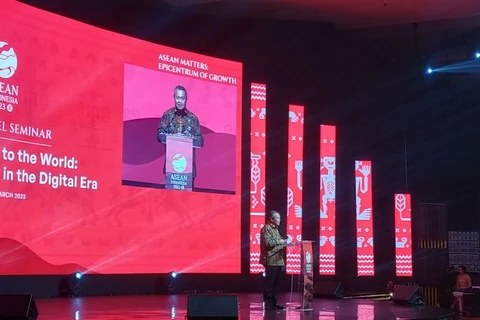Jakarta (VNA) – Indonesian Minister of Finance Sri Mulyani said on March 29 that financial exclusion remains a major challenge and also a crucial factor in ASEAN countries' economies, especially micro, small, and medium enterprises (MSMEs).
Speaking at a high-level dialogue seminar on promoting financial inclusion and literacy for MSMEs in Badung district, Bali, the minister said the development of digital technology and economy in the region is supposed to help turn financial exclusion into financial inclusion.
There are several ASEAN countries that still do not have a financial inclusion index, Mulyani said, noting that the condition reveals the large gap existing among countries in the region in terms of financial inclusion.
Mulyani also drew attention to the rapid development growth of digital technology and economy in the ASEAN after three years of the COVID-19 pandemic.
The pandemic has provided a promising opportunity, not only for countries to adapt to the way they work but also for the ASEAN region, as a whole, especially for MSMEs.
The ASEAN digital economy is expected to grow significantly in 2025, she stated.
The minister further noted that after the COVID-19 pandemic, the impact of the digital economy has become even more important, as it has become a kind of game changer.
For several countries, the digital economy has succeeded in enabling and also accelerating the use of electronic money from smartphones, financial technology services, and online banking.
She said that the aforementioned services pave a big way for MSMEs to participate in developing financial inclusion.
Digital services have enhanced and deepened the financial sector and at the same time improved access to formal financial products and services, Mulyani said./.
Speaking at a high-level dialogue seminar on promoting financial inclusion and literacy for MSMEs in Badung district, Bali, the minister said the development of digital technology and economy in the region is supposed to help turn financial exclusion into financial inclusion.
There are several ASEAN countries that still do not have a financial inclusion index, Mulyani said, noting that the condition reveals the large gap existing among countries in the region in terms of financial inclusion.
Mulyani also drew attention to the rapid development growth of digital technology and economy in the ASEAN after three years of the COVID-19 pandemic.
The pandemic has provided a promising opportunity, not only for countries to adapt to the way they work but also for the ASEAN region, as a whole, especially for MSMEs.
The ASEAN digital economy is expected to grow significantly in 2025, she stated.
The minister further noted that after the COVID-19 pandemic, the impact of the digital economy has become even more important, as it has become a kind of game changer.
For several countries, the digital economy has succeeded in enabling and also accelerating the use of electronic money from smartphones, financial technology services, and online banking.
She said that the aforementioned services pave a big way for MSMEs to participate in developing financial inclusion.
Digital services have enhanced and deepened the financial sector and at the same time improved access to formal financial products and services, Mulyani said./.
VNA























